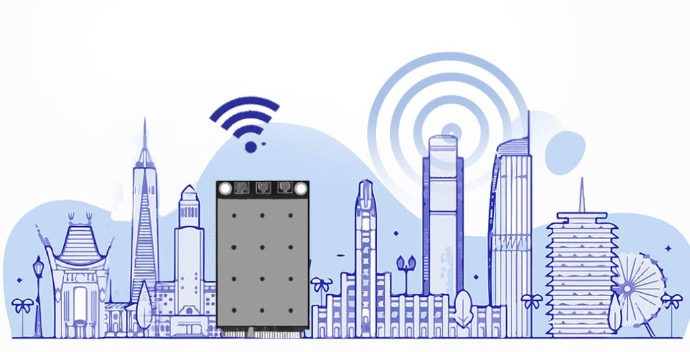Smart Cities & Infrastructure
Cities around the world are improving services and quality of life through data collection devices and sensors.The Challenge
RF technology is increasingly necessary for the implementation of complex smart cities and other smart infrastructure projects due to the increase in data collection devices and sensors.
Real-time information can vastly increase efficiency across many services, as well as improve health and safety. As many smart city applications are distributed across wide areas, wireless connectivity is often ideal for transmitting data to the
cloud. Intelligent RF connectors and effective cable assemblies and adapters enable wireless connectivity for nearly all smart city initiatives.
What We Do
We develop wireless combo modules, antennas, cables, adaptors, and testing tools that keep smart infrastructures connected. We are experts in wireless technologies and their aggregation, from Wi-Fi to Bluetooth to LoRa.
Wi-Fi is the actual backhaul infrastructure for all RF technologies that are needed in order to roll out a smart city. Nevertheless, wireless technologies that are used by the applications might have a different RF protocol as BLE and LoRa, which have to be aggregated towards the backhaul infrastructure.
Why VoxMicro
We are an innovation-oriented leading technology group with experience in complex, high speed and reliable wireless and broadband connectivity to urban communities and big-scale infrastructure.
We are a partner who deeply understands the pressure of the demanding wireless markets. We support customers to successfully navigate through their complexity using our certified high-quality wireless products and leveraging our comprehensive capabilities in managing and coordinating complex infrastructure projects from initial concept through implementation.

Why is Wi-Fi the building block for smart cities
No single technology is a panacea for every use case and application, however, Wi-Fi is at the forefront of smart city infrastructure. Given its cost efficiencies, the speed at which it can be deployed and the high bandwidth it delivers, as well as nearly universal support across mobile devices, Wi-Fi is now viewed as a basic building block for enabling the smart city.
Combined with cloud computing, sophisticated analytics software, location-based services, embedded sensors, mobile device applications, and other emerging new technologies, Wi-Fi has become an indispensable tool for helping municipalities achieve smart city status and do many things that were previously impossible or too expensive.
